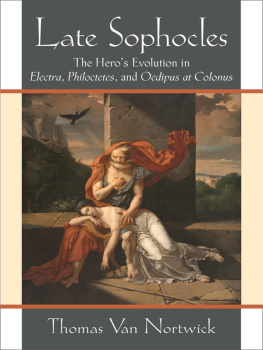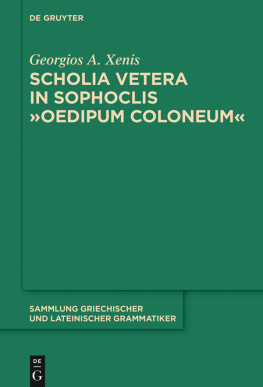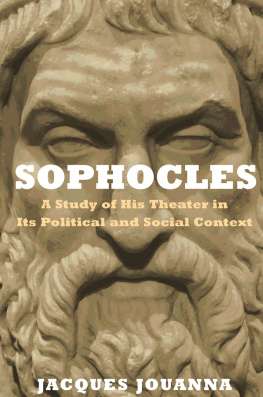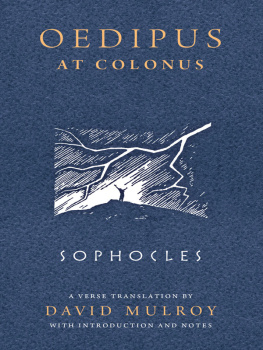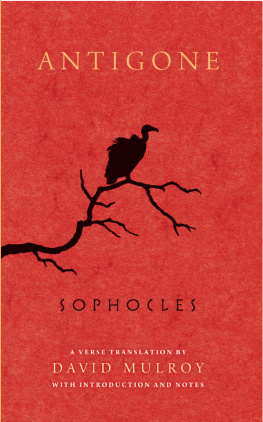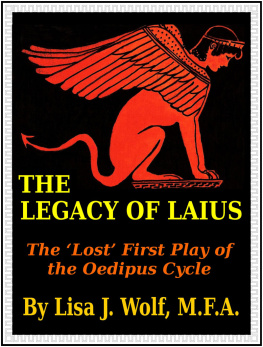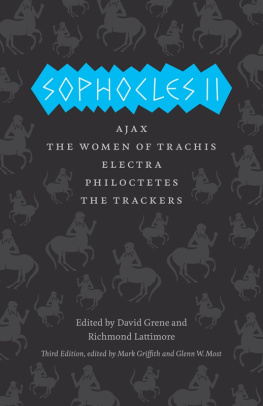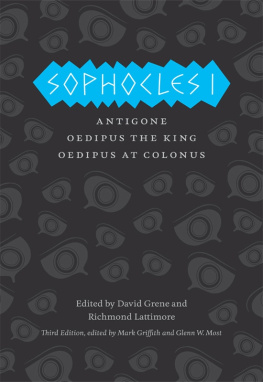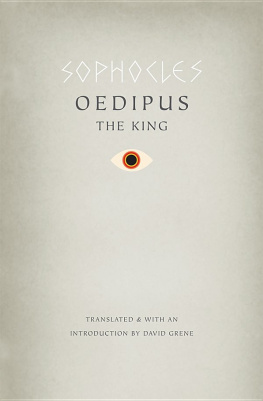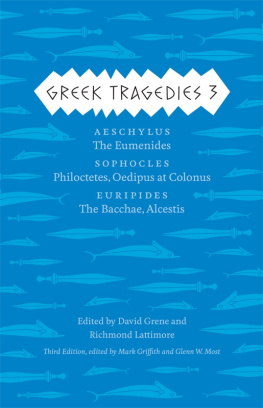Thomas Van Nortwick - Late Sophocles: The Hero’s Evolution in Electra, Philoctetes, and Oedipus at Colonus
Here you can read online Thomas Van Nortwick - Late Sophocles: The Hero’s Evolution in Electra, Philoctetes, and Oedipus at Colonus full text of the book (entire story) in english for free. Download pdf and epub, get meaning, cover and reviews about this ebook. year: 2018, publisher: University of Michigan Press, genre: Home and family. Description of the work, (preface) as well as reviews are available. Best literature library LitArk.com created for fans of good reading and offers a wide selection of genres:
Romance novel
Science fiction
Adventure
Detective
Science
History
Home and family
Prose
Art
Politics
Computer
Non-fiction
Religion
Business
Children
Humor
Choose a favorite category and find really read worthwhile books. Enjoy immersion in the world of imagination, feel the emotions of the characters or learn something new for yourself, make an fascinating discovery.
- Book:Late Sophocles: The Hero’s Evolution in Electra, Philoctetes, and Oedipus at Colonus
- Author:
- Publisher:University of Michigan Press
- Genre:
- Year:2018
- Rating:3 / 5
- Favourites:Add to favourites
- Your mark:
- 60
- 1
- 2
- 3
- 4
- 5
Late Sophocles: The Hero’s Evolution in Electra, Philoctetes, and Oedipus at Colonus: summary, description and annotation
We offer to read an annotation, description, summary or preface (depends on what the author of the book "Late Sophocles: The Hero’s Evolution in Electra, Philoctetes, and Oedipus at Colonus" wrote himself). If you haven't found the necessary information about the book — write in the comments, we will try to find it.
Thomas Van Nortwick: author's other books
Who wrote Late Sophocles: The Hero’s Evolution in Electra, Philoctetes, and Oedipus at Colonus? Find out the surname, the name of the author of the book and a list of all author's works by series.
Late Sophocles: The Hero’s Evolution in Electra, Philoctetes, and Oedipus at Colonus — read online for free the complete book (whole text) full work
Below is the text of the book, divided by pages. System saving the place of the last page read, allows you to conveniently read the book "Late Sophocles: The Hero’s Evolution in Electra, Philoctetes, and Oedipus at Colonus" online for free, without having to search again every time where you left off. Put a bookmark, and you can go to the page where you finished reading at any time.
Font size:
Interval:
Bookmark:
 Page i Page ii Page iii
Page i Page ii Page iii Thomas Van Nortwick
UNIVERSITY OF MICHIGAN PRESS
ANN ARBOR
Copyright Thomas Van Nortwick 2015
All rights reserved
This book may not be reproduced, in whole or in part, including illustrations, in any form (beyond that copying permitted by Sections 107 and 108 of the U.S. Copyright Law and except by reviewers for the public press), without written permission from the publisher.
Published in the United States of America by the University of Michigan Press
Manufactured in the United States of America Printed on acid-free paper
Printed on acid-free paper
2018 2017 2016 2015 4 3 2 1
A CIP catalog record for this book is available from the British Library.
Library of Congress Cataloging-in-Publication Data
Van Nortwick, Thomas, 1946.
Late Sophocles : the heros evolution in Electra, Philoctetes, and Oedipus at Colonus / Thomas Van Nortwick.
pages cm
Includes bibliographical references and index.
ISBN 978-0-472-11956-1 (hardcover : alk. paper) ISBN 978-0-472-12108-3 (ebook)
1. SophoclesCriticism and interpretation. 2. Sophocles. Electra. 3. Sophocles. Oedipus at Colonus. 4. Sophocles. Philoctetes. I. Title.
PA4417.V36 2015
882'.01dc23
2014049364
Page vFor Nathan Greenberg
colleague, mentor, and friend
Oh children, follow me. I am your new leader,
as once you were for me.
(Sophocles, Oedipus at Colonus 154243
Sophocless Oedipus at Colonus ends with his most famous character walking serenely through the central doors of the stage building (skn) in the Theater of Dionysus and into the grove of the Eumenides. For a blind old man, enfeebled by age, to make this journey is miraculous enough; that he is the plays hero is stranger stillno sign here of the familiar willful figure, defining him- or herself through defiance of higher forces in the universe. Rather, Oedipus reaches in this final exit the goal he announces at the beginning of the play: to achieve a glorious consummation at the end of his long and tumultuous life by obeying the will of the gods. His last walk, a riveting moment in Western theater, marks the end of Sophocless long and fruitful career as a playwright. In the old Oedipus, he completes a reimagining of the tragic hero that stretches across his last three extant plays, beginning with Electra, continuing with Philoctetes, and ending on the last day of Oedipuss life. That evolution will be the focus of this book.
All three characters are, as we will see, strikingly original. But their enduring fascination, for scholars, for directors, for playgoers and readers of the plays, is not mysterious. In their words and actions, we encounter large questions about human life. How do we balance the demands of our often imperious Page viii individual will with the need for community? Can the egregious powers of one person be harnessed consistently for the greater good? What is the place of human life within the larger cosmos? And most insistently, what does it mean to be human, to be a creature who knows that s/he must die? As vehicles for exploring such questions, Electra, Philoctetes, and the aged Oedipus take their place beside many other examples of the tragic hero, not confined to or originating in Greek drama or even Greek epic. Such figures can be found at least as far back as The Epic of Gilgamesh. But the rise of tragic drama alongside Athenian democracy and the centrality of the art form in Athenian public and intellectual life give the traditional heroic stories a unique and powerful resonance when they appear in the Theater of Dionysus. One of the goals of this book will be to show how the hero in Sophocless last three plays evolves to reflect contemporary issues in late fifth-century BCE Athens.
Though there are marked differences between the last three heroes, we can see certain common patterns in their relations with other characters and their roles in the articulation of the plot of each play. Each occupies a liminal position in relationship to the central myth that drives the plot; none is typically empowered to impose his or her will on others. Ragged and disreputable, deceived and manipulated by others who would use them for their own purposes, they seem unlikely candidates for the role of Sophoclean tragic hero. In the last decade of his life, the playwright appears to have set himself the challenge of writing plays that feature the eventual triumph of a disempowered protagonist rather than the ruin of someone who is viewed with envy by others. The nature of that triumph in each case is the key to understanding Sophocless purposes in his last decade as an artist. As we watch these unlikely heroes stubbornly resisting what the received stories require of them, our perception of traditional assumptions about behavior and motive carried in the structure of the myths is continually challenged: Can the Electra we see onstage really be healed by the deaths of Clytemnestra and Aegisthus? If Philoctetes is the chosen instrument for divine will in the fall of Troy, why is he discarded for ten years on a deserted island? And why is he chosen in any event? How can such a thoroughly reviled figure as Oedipus become the conduit for the working out of divine will?
When I began teaching Greek tragedy forty years ago, I had no direct experience with the problems faced by directors and actors who were seeking to bring the ancient dramas to life onstage. I presented the texts in the same way I did Homeric epic, as stories founded on ancient myths. Trying to explain the intellectual richness and complexity of the plays in this way was certainly challenging enough for a rookie teacher. And I was not out of step with my fellow Classicists. Page ix Sustained attention to issues of performance has come relatively late to Classical scholarship, beginning with the pioneering work of Oliver Taplin in the 1970s. The opportunity to work on several productions by the Great Lakes Theater Company in the 1990s added immensely to my own appreciation of these issues.
I also had much to learn about the chorus in Greek drama. The complexity of metrical structures in choral songs was (and is) daunting. Again, I have benefited from the excellent scholarship of others. Sophocles extended the dramatic expressiveness of his choruses in his last three plays, making their songs an even more integral part of the characterization of his heroes. In place of traditional stanzaic forms, sung exclusively by the chorus, we begin to see actors sharing their entrance song with the chorus, weaving their thoughts and emotions into the complex metrical structures. The characterization of Electra, for example, is articulated in part by her lyrical exchanges with the chorus (El. 121212); when Antigone leaves the stage to perform purification rites on behalf of her aged father in Oedipus at Colonus, past practice by Sophocles might lead us to expect a self-contained choral song, a reflective pause while action occurs offstage; we get instead an intense lyrical exchange between Oedipus and the chorus of citizens, raising, not lowering, the temperature onstage (OC 51050).
It will be evident to readers that my discussion of the last three plays owes much to these new approaches. But the primary focus of what follows is Sophocless vision of the tragic hero. There has been no shortage, of course, of excellent scholarship on this topic. Reinhardt, Whitman, Knox, Segal, and many others have all written brilliantly on the nature of Sophocless heroes. My debt to them will be obvious, and I have tried to acknowledge their ideas in the discussion that follows.
Next pageFont size:
Interval:
Bookmark:
Similar books «Late Sophocles: The Hero’s Evolution in Electra, Philoctetes, and Oedipus at Colonus»
Look at similar books to Late Sophocles: The Hero’s Evolution in Electra, Philoctetes, and Oedipus at Colonus. We have selected literature similar in name and meaning in the hope of providing readers with more options to find new, interesting, not yet read works.
Discussion, reviews of the book Late Sophocles: The Hero’s Evolution in Electra, Philoctetes, and Oedipus at Colonus and just readers' own opinions. Leave your comments, write what you think about the work, its meaning or the main characters. Specify what exactly you liked and what you didn't like, and why you think so.

